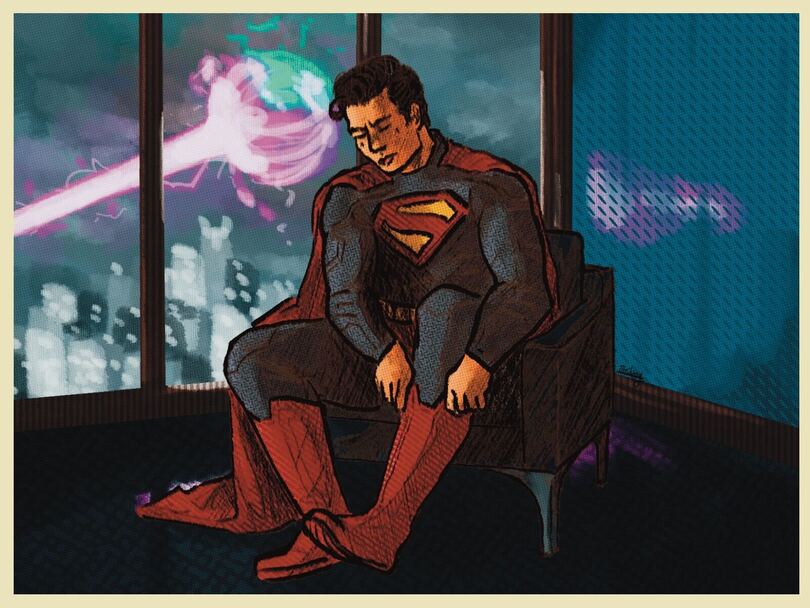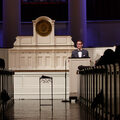Despite stagnant reboot, ‘Superman’ bodes optimistic dawn of DCU

Nicholas Hoult (Lex Luthor) and Rachel Brosnahan (Lois Lane) shine in "Superman," our columnist writes. In a film that fails to live up to the 1978 classic, Hoult and Brosnahan cement themselves as the best depictions of their characters in film. Sarah Yudichak | Contributing Illustrator
Get the latest Syracuse news delivered right to your inbox.
Subscribe to our newsletter here.
James Gunn’s “Superman” opens with a bird’s-eye view of our titular hero — bloodied, lying in the snow and struggling to breathe. Minutes after his first defeat, Superman (David Corenswet) summons his fluffy canine companion, Krypto, who playfully pounces on the tattered Man of Steel. As Krypto drags him to safety, the Fortress of Solitude rises out of the Antarctic ice, bearing Superman’s Kryptonian emblem on the door.
This intro drives home Superman’s humanity — a recurring theme — and reminds us why Gunn has found success in the superhero business. He meticulously weaves solemnity and humor, while creating epically fun pictures.
Unfortunately, the rest of the film didn’t live up to the excitement from this scene. As a whole, “Superman” didn’t bring anything groundbreaking to the genre.
The first installment of Gunn and Peter Safran’s DC Universe follows Superman and his alter ego, Daily Planet journalist Clark Kent. He grapples with twisted entrepreneur Lex Luthor (Nicholas Hoult), his love for colleague Lois Lane (Rachel Brosnahan) and the true reason his Kryptonian parents (Bradley Cooper, Angela Sarafyan) sent him to Earth.
Early on, we learn Superman stopped a war from breaking out between two fictional countries: Boravia (an aggressor and ally of the U.S.) and Jarhanpur (an economically and militarily inferior nation). Simultaneously, Luthor — who constantly defames Superman in the media — is secretly assisting Boravia.
Although Gunn denies any connection, the relationship between Boravia and Jarhanpur has drawn comparisons to the current Israel-Hamas war and Russia-Ukrainian war. Similarly, some believe Luthor’s imprisonment of people in a secret pocket universe parallels alleged abuse of power by federal law enforcement agencies.
Gunn touches on manipulation in the media and admittedly presents “Superman” as a story of immigration. While some real-world allusions feel obvious, they’re not overbearing; Gunn uses the medium to preach kindness and open-mindedness.
The film feels like the comic books are jumping off the page, screaming with Gunn’s signature playfulness. “Superman” even plays like a video game at times. Luthor developed a computational fighting system to aid the Hammer of Boravia, a metahuman. The LuthorCorp team remotely controls said metahuman and relies on him to gain momentum through combos — reminiscent of the “Super Smash Bros.” video games.
“Superman” takes a different approach than the 1978 classic “Superman: The Movie” and the divisive 2013 film “Man of Steel.” Gunn chooses to summarize Superman’s origin in the film’s opening text. He establishes that Lois knows Clark’s identity, which seems smart on paper — permitting character development without long-windedly covering inevitabilities — but the decision doesn’t completely pay off.
There are two goosebump-worthy moments in this film after the opening scene. During a Boravian attack, a Jarhanpurian child raises a flag donning Superman’s logo, representing the ultimate symbol of hope. Toward the end, Clark experiences a profound moment of acceptance, recognizing Ma (Neva Howell) and Pa Kent (Pruitt Taylor Vince) as his true parents, instead of his parents from Krypton.
Outside of this, “Superman” felt underwhelming. It was good, but not great.

Sophia Burke | Digital Design Director
John Murphy and David Fleming’s score is underused throughout the film. It doesn’t stack up to the iconic scores of John Williams (1978) or Hans Zimmer (2013) — two of the greatest film composers of all time.
The lack of resonance also stems from Corenswet’s performance, which was good, but, like his predecessors, doesn’t meet the legendary status of Christopher Reeves (1978).
While he offers more personality than Henry Cavill (2013), Corenswet, like Cavill, seemed limited by the script. “Superman” portrays the Last Son of Krypton as “weaker” than he’s usually represented, naturally making Corenswet’s presence less powerful than Reeves’. However, Superman’s vulnerability lets his sense of humanity shine, reinforcing him as a symbol of hope for the city of Metropolis and the world.
Out of every actor to play Superman, Corenswet’s physical appearance from Clark Kent to Superman is the most distinctive. Not only is his hair style visibly different, but this iteration of Superman wears “hypno-glasses” that mask his identity, making the alter ego more believable.
Though Corenswet’s performance wasn’t my favorite, the film introduces us to many commendable characters, including the “Justice Gang”: Mr. Terrific (Edi Gathegi), Green Lantern (Nathan Fillion) and Hawkgirl (Isabela Merced). Hoult and Brosnahan’s performances shined though, highlighting an excellent supporting cast.
Hoult — who starred in “Juror #2” and “Nosferatu” last year — transforms into the iconic villain. He perfectly captures Luthor’s brains-over-brawn mindset while cranking up the intensity when needed. Hoult cemented his performance as the best depiction of Luthor in film, even more believable than the renowned Gene Hackman in “Superman: The Movie.”
As for Brosnahan, she’s my favorite part of the movie (alongside Krypto). With a performance on a par with Margot Kidder’s (1978), Brosnahan is a firecracker on screen, flawlessly balancing Lois’ wit, professionalism, fearlessness and empathy.
In a career-defining scene, she interviews Superman and (despite being in a relationship with him) plays devil’s advocate, asking him difficult questions. Here, the Pulitzer Prize winner comes to life. My mom — a lifelong fan of Christopher Reeves’ Superman films — turned to me during Brosnahan’s very first scene and said, “She’s like the perfect Lois.”
Despite some wasted space and few memorable moments, you can count on Gunn — writer of “Scooby-Doo” and director of “Guardians of the Galaxy” — to deliver a witty script. The comedic relief is headlined by an obligatory James Gunn CGI animal, Krypto, who’s inspired by his own dog. Although the film isn’t as serious or genre-defining as “The Dark Knight” — it’s not trying to be — Gunn’s signature charm is certainly a redeeming quality.
Corenswet hasn’t reached the pop-culture icon status of Reeves (impossible to achieve overnight), but the film is a love letter to DC Comics, even including a “Gotham City” highway sign.
“Superman” undoubtedly piqued my interest in the new DCU, but the upcoming projects must be improvements. If not, this DC reboot risks becoming as forgettable as the Marvel Cinematic Universe after the “Infinity Saga.”






